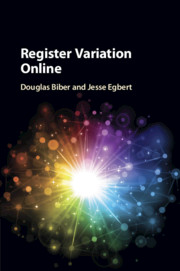Book contents
- Register Variation Online
- Register Variation Online
- Copyright page
- Contents
- Figures and Screenshots
- Tables
- 1 Introduction
- 2 Corpus and Methods
- 3 A Survey of the Registers on the Publicly Searchable Web
- 4 Overall Patterns of Register Variation on the Searchable Web: A Multidimensional Analysis
- 5 Narrative Registers
- 6 Opinion, Advice, and Persuasion Registers
- 7 Informational Descriptions, Explanations, and Procedures
- 8 Oral Registers
- 9 The Web as a Continuous Space of Register Variation
- Book part
- References
- Index
- References
References
Published online by Cambridge University Press: 31 August 2018
- Register Variation Online
- Register Variation Online
- Copyright page
- Contents
- Figures and Screenshots
- Tables
- 1 Introduction
- 2 Corpus and Methods
- 3 A Survey of the Registers on the Publicly Searchable Web
- 4 Overall Patterns of Register Variation on the Searchable Web: A Multidimensional Analysis
- 5 Narrative Registers
- 6 Opinion, Advice, and Persuasion Registers
- 7 Informational Descriptions, Explanations, and Procedures
- 8 Oral Registers
- 9 The Web as a Continuous Space of Register Variation
- Book part
- References
- Index
- References
- Type
- Chapter
- Information
- Register Variation Online , pp. 243 - 246Publisher: Cambridge University PressPrint publication year: 2018



